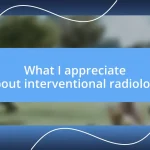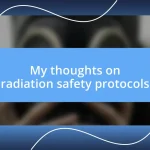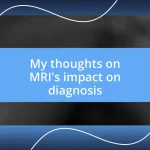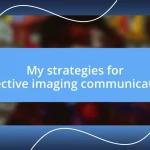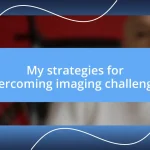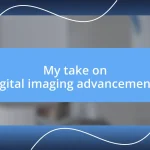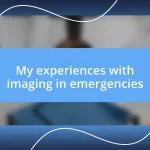Key takeaways:
- Genetic risk assessments can empower individuals by providing insights into hereditary health risks, promoting proactive health measures.
- The assessment process involves selecting a reputable testing service, reflecting on family health history, and interpreting results collaboratively with healthcare professionals.
- Engaging family in conversations about health history and creating tailored health strategies based on findings can enhance personal well-being and strengthen familial bonds.

Understanding genetic risk assessments
Genetic risk assessments can feel like a complex puzzle to many, but at their core, they help individuals understand their likelihood of developing certain hereditary conditions. I remember the day I received my results; it was a mix of curiosity and anxiety. What exactly do these numbers mean for my future? This is a common feeling when grappling with genetic information and the implications it might have.
When I first engaged with genetic testing, I deeply appreciated the insights it provided about my family history and potential health risks. I found myself reflecting on my relatives’ health challenges—were these just coincidences, or was there a genetic component at play? For many, this knowledge can be empowering, as it opens the door to proactive health measures; it prompts questions that lead to more informed lifestyle choices.
Yet, it’s important to recognize that genetic risk assessments do not dictate destiny. While they can indicate increased risks, they don’t guarantee that conditions will manifest. I often remind myself that embracing a healthy lifestyle can mitigate these risks significantly. Have you ever considered how much control you hold over your health, despite what the genetic markers suggest? It can be a powerful realization.

My initial thoughts on assessments
Initially, I was quite skeptical about genetic risk assessments. The thought of having my genetic predispositions laid out in front of me felt daunting. I couldn’t help but wonder how accurate these assessments really were. Would this information change how I viewed myself or my loved ones?
- I recall sharing my concerns with a close friend who had undergone testing as well.
- She mentioned her own mix of anxiety and relief upon receiving her results, which resonated with my feelings.
- It made me realize that these assessments can evoke a spectrum of emotions, from fear of the unknown to empowerment through knowledge.
- In the end, I understood that the assessments are more about understanding probabilities rather than predetermining my future—something I had to keep reminding myself.
As I pondered these thoughts, the idea of personalized health management began to take root in my mind. Each assessment seemed to reveal patterns in health that were not just about me, but deeply intertwined with my family’s history. It felt like a treasure map, guiding me to a better understanding of potential health risks and actionable steps I could take. This perspective shift helped alleviate some of my initial apprehension, turning it into a more constructive and proactive outlook.

The process I followed
The first step I took in the process of genetic risk assessment was selecting a reputable testing service. I spent hours researching different companies, reading reviews, and comparing their offered services. When I finally settled on one, I felt a rush of determination mixed with uncertainty. Would this be the key to unlocking answers about my health?
Next, I filled out a detailed questionnaire that accessed my family health history. It was a moment of reflection, as I recalled stories I’d heard growing up about relatives who faced serious health issues. Filling in those details made the experience feel more real. It hit me that this wasn’t just a scientific process; it was deeply personal.
Finally, I awaited the results—a period filled with anticipation and a hint of anxiety. When the report arrived, I realized it was more than just numbers and probabilities; it was a conversation starter about my health. I could share findings with my doctor, engage in discussions with family about health history, and even explore lifestyle changes. Each stage of this journey contributed to a deeper understanding of myself and my risks, forging a path for proactive health decisions.
| Step | Description |
|---|---|
| Selecting a Testing Service | Researching different companies and reading reviews before choosing one that felt right. |
| Completing the Questionnaire | Reflecting on family health history and filling out the details to connect the personal with the scientific. |
| Awaiting Results | Experiencing mixed emotions of anticipation and anxiety before receiving and interpreting the findings. |

Key findings from my assessment
Reflecting on the results of my genetic risk assessment, I found myself surprised by the nuanced insights it offered. For instance, one particular finding indicated an increased likelihood of certain hereditary conditions from my family tree. This revelation felt like a confirmation of my experiences, as I’d often wondered about the health struggles some relatives faced. It stirred up a mix of emotions—regret over missed conversations with family and a sense of urgency to take proactive steps towards prevention.
One specific highlight was learning about my predisposition to elevated cholesterol levels, which prompted me to rethink my dietary choices. I remember standing in the kitchen, holding up an avocado, and asking myself, “How can I transform this information into meaningful change?” It was empowering and terrifying all at once. The data offered me a lens through which to view my daily habits and health decisions, helping to frame my journey as one of personal agency rather than fate.
Through this assessment, I also recognized patterns that weren’t merely scientific statistics—they felt like echoes of my family stories. That realization hit home when I processed my results with my doctor. Together, we pieced together how my inherited traits could inform personalized health strategies, making the experience feel like a collaborative discussion rather than a one-sided report. It left me wondering how many others might find themselves with a similar opportunity for reflection and action, opening the door to transformative conversations about family health.

Resources for further understanding
When diving into genetic risk assessments, there’s a wealth of resources that can help you deepen your understanding. I found that reputable websites like the National Human Genome Research Institute provide clear, comprehensive guides about genetics and health implications. They simplified complex topics, which made me feel more equipped to navigate my own results. Have you ever felt overwhelmed by the amount of information out there? Trust me, curated resources can make a significant difference.
Another valuable resource I discovered was community support groups, both online and offline. Joining forums allowed me to connect with individuals who shared similar experiences. Hearing their stories helped me process my emotions—those moments of fear and excitement that came with exploring genetic information. It struck me how important it is to have a sense of belonging during such a vulnerable journey. Have you ever wished for a sounding board while navigating health issues?
Don’t overlook books and documentaries, either. A well-recommended book I read, “The Gene: An Intimate History” by Siddhartha Mukherjee, was a game-changer. It provided not just scientific insights, but also personal narratives that resonated with me. I remember marking passages that mirrored my feelings, wishing I had that perspective sooner. Engaging with these materials not only expanded my knowledge but also made me feel part of a broader conversation about genetics and identity. What resources have you come across that made your journey more enlightening?

Practical steps to take next
After receiving my genetic risk assessment results, the next practical step I took was to consult with a genetic counselor. I remember the relief I felt when I finally found someone who could help me untangle the complex information and provide personalized advice. Do you ever feel lost in a sea of data? Talking it through with a professional brought clarity and focus to my concerns, turning abstract risks into manageable actions.
Next, I began to create a tailored health strategy based on my findings. It was a mix of joy and frustration as I started experimenting with new recipes and workouts. For example, I began incorporating plant-based meals, finding joy in discovering how to make my diet as vibrant as my aspirations. Have you tried changing your routine based on newfound information? I realized that these changes not only aimed at mitigating risks but also enhanced my overall wellbeing.
Lastly, I made it a point to engage my family in discussions about our shared health history. This step felt monumental. It was about understanding our family narratives and fostering deeper connections. I often found myself asking relatives about their health experiences and learning more about our genetics than I ever did at family gatherings. Isn’t it fascinating how sharing those stories can empower us? By opening those floodgates of conversation, I not only enriched my understanding but also strengthened our familial bonds.
